Legal services are undeniably expensive. “People don’t have access to justice,” says Charley Moore, CEO of Rocket Lawyer, whose aim is to make legal services simpler and more affordable.
Matt Holleran, General Partner at Cloud Apps Capital Partners, moderates this panel led by Charley about the wisdom gained from getting to 100,000 paid subscribers (and millions of freemium users).
In his time growing Rocket Lawyer, Charley has learned not to shy away from experimenting; there’s always risk involved, but you’ll fail if you remain stagnant. Charley’s experiments led to several changes in his company, one of which was exploring a freemium model – a move that ended up attracting millions of users and ruffling more than just a few feathers.
Check out the full transcript below! You can view the slides here.
If you want to see more sessions from 2016, we’re releasing a new one each week. Subscribe here to be notified. And be sure to grab your tickets to the 2017 Annual NOW.
TRANSCRIPT
Matt Holleran: It is my pleasure to introduce Charley Moore, the founder and CEO of Rocket Lawyer. He’s going to talk to you about the challenges of getting to 100,000 paid subscribers and in leading and growing a great business. With that, Charley, it’s very nice to see you.
Charley Moore: Great to see you, man.
[applause]
Charley: I’m going to stand up.
Matt: Please.
Charley: If you don’t mind. I’m thrilled to be here. I want to thank Jason. Jason and I actually went to law school together. For those of you who don’t know, Jason Lemkin is a lawyer. I knew him when, and I’m just thrilled to be here.
I’m Charley Moore. I’m the founder of Rocket Lawyer. We’re an online legal service. We’re bootstrapped as well, to get started. Our mission is to make law affordable and simple for everyone. I always start out by just saying there’s nobody in the room that’s going to raise our hand and say that legal services and lawyers don’t cost too much, or are affordably priced. I’m a former high priced lawyer at a Silicon Valley Law firm.
People don’t have access to justice. Justice is the fair administration of the law or authority. That’s our mission, to bring down the cost of legal services so that the majority of people who are currently priced out of the market for legal help can afford it. With that, I’ll talk about how we started as a bootstrapped company. Now are north of 100,000 paid subscribers and 10 million users all together.
I organized this talk into…you have 1,000 users, you have 10,000, 25,000, 100,000, and beyond. When we got started, every single order that was placed, pinged my phone. I got a ping every single time. I was jumping for joy. At a thousand paying customers, just live in the moment. The first thing I would say is, starting a business should be a joyful experience. Selling a brand new product successfully to over a thousand people, that’s amazing.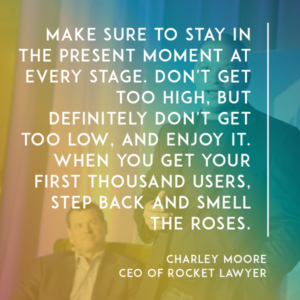
While entrepreneurs are usually their biggest critics, yours truly included, make sure to stay in the present moment at every stage. Don’t get too high, but definitely don’t get too low, and enjoy it. When you get your first thousand users, or those who already have, step back to take a minute and smell the roses, enjoy the present.
Beyond that, like I said, when we started every single order pinged my phone, our team was a tiny little group. Every time that we got an order, we discovered new things about the service, things that were broken, things that we could do better.
This was about the time that a major celebrity tried out our infant legal service. We couldn’t believe it. We created Rocket Lawyer to make the law affordable and simple for regular people. We were shocked to find out that this worldly wealthy person was using this discount legal service.
It was that time that we realized that maybe there was a bigger set of problems that we could solve, beyond just cost. It opened our eyes to the possibility that maybe Rocket Lawyer really could be for everyone. Lesson number one, as it says up there, is to stop and enjoy the journey. You never know where it’s going to lead.
Congratulations, you’ve now got 10,000 paying customers. You’re probably a real business at that point, even though still small. We were still small then. Maybe 50 employees or so, but you’ve got 10,000 paying customers. As I said we were bootstrapped at the beginning. We had to find a revenue model early, and not get too far out in front of our skis.
Rocket Lawyer was not a company that ever had the luxury of, “We’re going to get a million users and see what happens.” We didn’t roll like that. One of the risks that we took, even before we had venture backing, is a free trial and start to explore freemium model. Much of our journey upward actually has been opening up more and more of the service to users for free, never forgetting that at the core, our mission is to bring justice to more people at lower cost.
We intend to continue to open up more and more of the services for free. A lot of that has just been a working capital thing. The more working capital we get, the more we open up for free, and the more we get people like Michelle who lives here in San Francisco, one of our customers.
She owns a small business. She rents apartments, great business in San Francisco. She started out using Rocket Lawyer for personal matters. Estate planning, she had an issue with her mom, a health crisis with her mom which is not unusual. As all of us, our parents are aging. Also to handle child care for her two young girls.
What we found out is as we started to explore freemium model, we let users like Michelle start to do some things for free and explore. She actually started using Rocket Lawyer for her business as well.
If you don’t try it, you’ll never know. 10,000 is actually a really good time to experiment. I’m going to talk about experimentation all the way through. There’s a tendency again especially for a business like ours that we needed the revenue to not try new things when you find something that’s working. You really have to break it over and over again to learn.
One of the things we learned is one price doesn’t fit all. Michelle was a great example of that. As we let her try more things for free, she became an even better customer for us.
Matt: Charley, it takes courage to open up the aperture on free. How did you think about that decision with the users and with the lawyers.
Charley: Yes, that’s a great question. I’m getting to that because we dipped our toe in the water of free. What we found out is, my gosh, how fast people started coming in to the service.
It didn’t take actually that much courage. It took that courage to try it. What took more courage, I’m going to get to a little later, is when the rest of the industry started suing the hell out of us. I’m a lawyer, so I don’t begrudge people using legal system. The more audacious that we got with our free service, the more we started disrupting, ruffling feathers.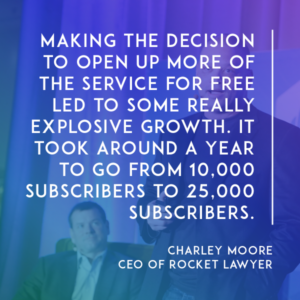
Making the decision to open up more of the service for free led to some really explosive growth force. It was only maybe a year where we went from the 10,000 subscribers to 25,000 subscribers, but as we found out, if it breaks and you have 25,000 paying subscribers, by the way now that it’s a freemium service, we had well over a million, close to two million users all together when we had the 25,000 paying users. That’s a lot of people and if it breaks, you’re going to make a lot of people mad. And we did. [laughs]
25,000 subscribers and more than a million users is when we massively committed to investing in our team and infrastructure. It’s when we hired people really fast, may be a hundred people in a year. That was when we raised the venture capital. When we really started to understand that we had an opportunity, but we could really screw it up. We could screw it up fast.
We realized that our proof of concept code was breaking. We had too many corners in it. We had to start over with the whole code base and build a new platform.
We’re still building on that same platform, and it’s a few years later. That platform has taken tens of millions of dollars to build. It’s still work in progress, but it has resulted in the business that can now scale far beyond where it was then and hopefully where it’s going.
Another thing that we had to really invest in at about that 25,000 paying subscriber level is customer support. One of the things that we learned is Rocket Lawyer is actually better for business.
We started to hire people like Ashley Hess, who is at our Ogden, Utah office. Before customers like Lisa Murphy, who’s the owner of Sosu Sauces. Lisa incorporated her business with us. She does any of our legal matters that come up. We handle them for her, but Lisa needs somebody to talk to.
We had to start investing in people for our business users to talk to. This is when we figured out, as I said, that business people are our best customers. Self-employed individuals and small business operators now make up the majority of our revenue. Even though individuals, families are still the vast majority of our users, it’s those business customers that are 80 percent or more of our sales today.
In becoming a company that worked with small businesses primarily, we had to add an inside sales team focused on those SMBs. We had to learn all about sales process and sales metrics. We now had SMBs as our key customers. We had to hire a VP of customer success, and go through the process of opening our own call center, managing our own call center. We wanted to do that, the Rocket Lawyer way.
Today, we have about 50 people on the phones all the time in Ogden, Utah. We did a bake off among three different cities and decided on Ogden for variety of reasons.
All of those issues really came to the fore when we had about the 25,000 users. I can’t say enough about the transformation our business when we committed to having somebody for our business users to talk to. We pride ourselves on software that’s easy to use. We were a pioneer in legal services which is dense with lots of words.
The websites were dense. The apps were dense. Everything was full of words. When we started Rocket Lawyer with an idea that those services were for people who wanted to read a bunch of legal jargon, and we were for people who didn’t want to read. And that we were going to do OK.
Part of that is we needed to have people to hold people’s hands on the phone and chat, etc. People like Braden, Russell, Tessie, Ashley, talking to customers. Again, a landlord, a DJ, Lisa, you met, a tech entrepreneur. The last person listed there. It was also when we started to learn who our customers were, and how to segment, and how to deliver the customized type of interaction with them that their segment demanded. We were growing up.
Ok, here’s what we were talking about [laughs] a minute ago.
Matt: Yes.
Charley: About 50,000 subscribers, over 20 million in annual revenue, maybe 5 million users all together. That was the time that the wolf started coming to the door. That was the time that incumbents, regulators, people started knowing who Rocket Lawyer was, started to, some perceive Rocket Lawyer as an opportunity. Many perceive Rocket Lawyer as a threat.
As I said, I’m the last person on earth to begrudge anyone getting lawyered up and availing themselves of our magnificent legal system.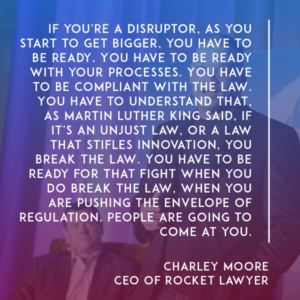
But, if you’re a disruptor, as you start to get bigger, you have to be ready. You have to be ready with your processes. You have to be compliant with the law. You have to understand that, as Martin Luther King said, “If it’s an unjust law, or a law that stifles innovation, you break the law.” You have to be ready for that fight when you do break the law, when you are pushing the envelope of regulation. They’re going to come out at you privately. They’re going to come at you as far as government compliance is concerned.
As it says here, watch your back. Our biggest competitor, LegalZoom, launched a very public lawsuit against us three years ago, as they started perceiving us as more of a threat. We had to be able to fight back. As Michael Arrington posted on TechCrunch, “I don’t know who’s going to win this battle, but I’m going to buy my legal services from whoever does.” It’s over, we’re still standing.
Matt: [laughs] This one is interesting. As well from a venture capital perspective because to some degree, if there isn’t ultimately conflict, it’s not interesting. It sounds like it became very interesting. You need to have the right venture people around the table that appreciate that and can do that, and you certainly have done so with the firms that you’ve worked with.
Charley: That’s a great point. I maybe will write a book [laughs] about that part, board dynamics. Corporate governance was my career before I started Rocket Lawyer. It is really important that your board has the right culture, that you’re very transparent with your board, that your board is part of these decisions. You need them behind you.
These things take a lot of time, so we did subsequent rounds of financing with this litigation pending. Actually that turned out to be a really good thing because the people who got on board were really on board at that point. You’re absolutely right. You have to pick your…it’s just about culture and it’s about transparency communication ultimately. That’s a great point.
Moving on, paywalls. You have 50…the context here. You’ve got 50,000 paying customers. If you’re freemium service you have millions of free users. You’ve got a lot of demands at this point. You’re probably doing business outside the United States. This is about the time that we launched Rocket Lawyer UK.
If you have invested in an infrastructure, you’re maybe burning a lot of cash at this point. It’s time that investors are starting to look at you as more of a later stage enterprise. You have to start to think about paywalls and revenue, but it’s really important to do it in a way that builds user trust.
We’ve realized now after a lot of testing and a lot of hard work that users really don’t mind paying for things if the paywalls are contextual, and after we’ve gained their confidence in the product.
Here’s an example of a mobile experience where somebody’s creating a document on Rocket Lawyer. We’ve given them a certain amount of documents for free. Now, we want them to pay for the next one. We spent a lot of time and energy and money on an e-commerce service that is home grown that enables us to do all that stuff consumers expect. One click, bang, you’re done, all of those sorts of things, convenience. It makes a big difference for the user.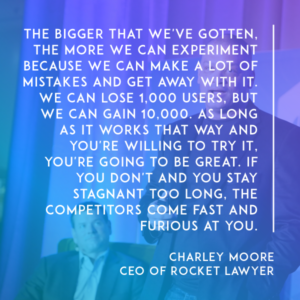
Another thing about that 50,000 subscriber part and about taking risks, the bigger that we’ve gotten, the more we can experiment because we can make a lot of mistakes and get away with it. You have to do that. We’ve made some doozy mistakes. What’s great is as we’ve grown, we found that we can fail more and not less often.
As I said, we can get away with it because we can lose 1,000 users, but we can gain 10,000. As long as it works that way and you’re willing to try it, you’re going to be great. If you don’t and you stay stagnant too long, as we’ve seen in our business, the competitors come fast and furious at you doing the same old thing over and over again.
A part of experimenting is you have to love your experiments that don’t work. You’ve got to love your losers. One of my big losers as the founder is I really, really believe that we can sell a lot of insurance at Rocket Lawyer. I still think so, but we haven’t pulled it off yet.
We’ve had a couple of partnerships with big insurance carriers to sell life insurance. We’ve had more success with business insurance. And sort of the theme, we’ve had more success business in general making money than consumers. Life insurance, it makes perfect sense. The average person who comes in to do an estate plan, they don’t have a lot of assets.
In having life insurance is really something that is good counsel to their families. I still think that if we give them the right counsel, good counsel that it’s going to work out in the end, but we really haven’t figured it out yet and have had a lot of losers in that part of the business. However, we’ve had a lot of winners as well.
Here’s an example of something that’s worked out beautifully. You’ve really got to double down on your winners. This was pretty simple. We started Rocket Lawyer right before smartphones became ubiquitous. Admittedly, we were in not initially a mobile first company. We’re desktop. That’s changed. Many of our winning improvements over the last few years have been happening on phones.
This is a really simple example of a registration change that doubled our mobile registration rate as a result that drove up our overall registration rate in a really, really meaningful way. Again, it was just back to context and making sure that it was contextualized why we needed personally identifiable information so that you can save your work, share your work with others.
As we get better at contextualizing why we’re asking for stuff, customers have trusted us more. Our registration rate on mobile has doubled. Mobile is rapidly becoming the majority of our user base. You’ve doubled again, 100,000. You’ve gone from 50,000 to 100,000 paying users. I’m up here to give advice. As I said, we started out being bootstrapped.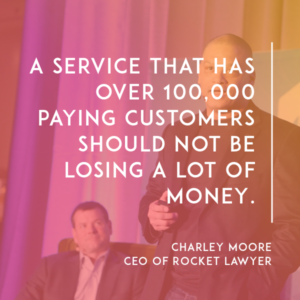
Losing money makes me really nervous. A lot of you probably run businesses that are bigger than ours, that may have a lot more revenue, maybe more profitable or burning a lot more money. For us, and again I think it’s a cultural thing, I just think that a service that has over 100,000 paying customers should not be losing a lot of money.
Maybe that’s just me, but I think it’s really worked out well for us that between 50,000 and a 100,000, we have been screaming. We’re not quite profitable yet, but we’re really, really close. We’ve been screaming toward being profitable business. We’ll be quite a nice cash flow positive business in the years to come. Not without a lot of focus on the bottom line and hard work.
Last one. The 100,000 bonus tip is you’re not that big yet. 100,000 paying subscribers probably between $50, $100 million of revenue, but there’s a whole big world out there. We’ve got get to a million. I hope to come back to SaaStr when we have a million paying users. Thank you, and good luck.
Matt: First of all, Charley, personally from my friends, from my family, people all over the world, thank you for democratizing legal services. It’s greatly appreciated. Are there any questions for Charley from the audience?
Audience Member: When looking at adoption, you either have a pay wall somewhere on the website or you can charge through the Google Play Store or iTunes. How do you make that decision, because you make better adoption, but you lose 30 percent of your revenue versus point them somewhere else to then log into the mobile app?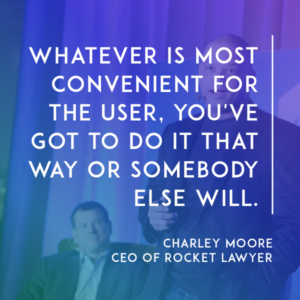
Charley: We’re all about what the user experience. For users, it’s more convenient for them. You have to be where they are. That’s my answer to a lot of things. Whatever is the most convenient for the user, you’ve got to do it that way or somebody else will. There’s also, not to get too deep into the numbers, but if you look at the customer acquisition cost, the 30 percent on the Play Store, the App Store isn’t really out of whack with acquisition costs elsewhere. For us, that really hasn’t been an… it’s something we talk a lot about, but the decision ultimately comes down to make it super, super drop dead simple for the user.
Audience Member: Thank you, Charley. I’ve used Rocket Lawyer for probably about five years now.
Charley: Thank you.
Audience Member: I’ve watched you guys transition from what was the interface and experience before to now what it is now. When you guys ripped up the old code, did you hit the metrics you were going for or was it is just you knew the old code was just not good enough to scale? How did you measure making sure that your new code hit the metrics that you wanted to hit once you launched it?
Charley: There’s a lot to unpack there, but first thank you for being a customer.
Audience Member: You’re welcome. It’s worth it.
Charley: [laughs] Thanks. It’s an arduous process, I won’t lie to you. If I could do it all over again, I would have started with where we are at now. We weren’t able to do that. It’s been very, very, very incremental for us. We did not rip out the old code base all at once. In fact, we still run a sliver of the business on the old code base.
What we committed to was every new service that we introduced was on the new code base. We committed to being API driven, service oriented. We committed to pushing a lot of code upfront. We’re doing more Node.js and development like that.
We made a commitment to an architecture, but we did not…in fact, the places where we could have had really disastrous results, and almost did, is we went through a stage in the business where there was this dogma and some dogmatic engineers associated with, “Oh that’s horrible and this is the only way to do it.” Today I think the team is more balanced and again more user focused.
We didn’t rip it all out, but we’re almost done replacing it. It’ll probably take another year, maybe even 18 months before it’s all gone. If you’re a user and you like it, we just re-focused ourselves on thinking about, look we’ve got a service that we need to deploy rather than any sort of dogma and, “I’ve got a Java jersey on and I’ve got a Scala jersey on and whatever.”
Audience Member: Charley, a quick question over here. Could you talk a little bit about how your customer acquisition efforts changed going to 10,000 and then up to 100,000? Did things shift in terms of what type paid acquisition you’ve done? How did you compete with people like LegalZoom that had been there for years and were probably dominating a lot of things like Google AdWords?
Charley: We started out doing a lot of paid acquisition, a lot of search marketing. We still do a lot of search marketing. We’ve always been good at search marketing. That was a core competency that we started the business with.
Overtime, the majority of our traffic comes from sources other than search marketing, but our search advertising budget is actually bigger year after year. The brand, you get more word of mouth. We introduced services like eSign, very viral service. We originally licensed EchoSign. I was one of Jason’s first customers.
Eventually, we decided to build our own eSign service just because of the scale. We do about 40 million legal documents a year on Rocket Lawyer. That added virality. First and foremost don’t run out of money. If you don’t, you just naturally…we’re getting bigger. There’s more word of mouth. We’ve expanded our advertising channels.
We also, and I’m going to put a shameless plug out there, one of the exciting ways we’re acquiring users now is…I bet there’s many companies here that are customers of ours, you can receive Rocket Lawyer as an employee benefit.
[laughs] Ask your employer, if you don’t have a Rocket Lawyer account that will get you help from lawyers at a real affordable rate. That’s another way that we’ve been acquiring users.
Audience Member: A quick question. We also work in the build the product for a legal space, but my question is in, you mentioned dogmatic engineers. How many of those do you have and how do you deal with engineers who are stuck up on the old ways and don’t want to change…
Charley: Say the last part again. How do we deal with engineers…
Audience Member: With engineers who are stuck up on the old ways or like, “This is the way it has to be and there is no other way.” How do you deal with engineering team who’s…?
Charley: I got to eavesdrop on the last conversation. There was a conversation about, when do you just have to let somebody go. Ultimately, you have to have a consistent culture. Either folks are in or they’re not in that culture. Engineering is a place where you really need a consistent culture, in my opinion.
Over the years, we have an engineering office in Mexico that’s been phenomenal. It’s got about 30 developers in that office. We’ve hired a bunch of engineers in our London office. Of course, our biggest office is still San Francisco. For us, it’s Mexico, London, San Francisco. Even though they’re different nationalities, there’s a really consistent culture.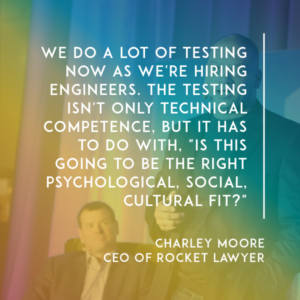
We’ve worked hard to develop what we call the Rocket Lawyer way. It was really homegrown, but it’s documented. We train new engineers as we hire them. We do a lot of testing now as we’re hiring engineers. The testing isn’t only technical competence, but it has to do with, is this going to be the right psychological, social, cultural fit for just how we have to do things.
Audience Member: Thank you.
Matt: Please join me in thanking Charley for sharing his wisdom from Rocket Lawyer.
Charley: Thank you.
You can view Charley’s slides here.
